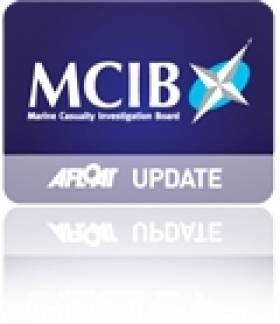Displaying items by tag: Skellig Islands
MCIB Report On 'Flying Horse' Highlights Safety Issues
#MCIB - 'Safety first' is the message from marine investigators in their report into an incident on board a sightseeing vessel off the Skellig Islands two years ago.
The Flying Horse, a 33-foot passenger boat crewed by a single skipper, was carrying 14 passengers towards Skellig Michael on the morning of 29 June 2012 when it began taking on water after coming off a large wave.
The skipper then turned the boat around and attempted to contact the owner by mobile phone, without making any use of the vessel's VHF radio.
The passengers also have difficulty accessing the boat's lifejackets from their storage compartments, and there were not enough for all on board.
All were landed safety ashore at Ballinskelligs, Co Kerry, though they were "somewhat traumatised" by the experience.
The official report into the incident my the Marine Casualty Investigation Board (MCIB) identified a number of safety issues with the Flying Horse, not least a lack of proper instruction for donning lifejackets.
MCIB investigators identified the boat's speed before the incident to be around 18 knots, too fast for the rough seas at the time, which contributed to the hull damage that saw the boat take on water.
Moreover, no official records could be found to show that the skipper held the necessary qualifications to be the master of boat in question. or that he was in possession of a Radio Operator’s Certificate - a requirement for all passenger vessels.
The boat was also found to be technically overloaded, carrying two more passengers than allowed by its licence - not to mention "insufficient" crew for her safe operation.
The full report is available to download below.
Lecture: 'Searching for Saints-Skelligs to Iceland'
#LECTURES-Paddy Barry will be presenting "Searching for Saints –Skelligs to Iceland" the second of five Winter talks in a programme organised by the Dublin Bay Old Gaffers Association (DBOGA). The talk takes place this Tuesday evening at 8pm in the Poolbeg Yacht and Boat Club, Ringsend in Dublin Port.
Those wishing to attend may wish to arrive a bit earlier so to avail of the PYBC's clubhouse facilities, which overlooks its marina in the centre of the port, opposite Alexandra Basin.
The venue is located on the South Bank, Pigeon House Road, Ringsend which can be accessed from the Sean Moore Road that connects the Merrion Strand Road (from the south) and the East-Link Toll Bridge (from the north).
For further information on the DBOGA lectures and more click HERE. In addition information about the PYBC Tel: (01) 668 9983 or logon to www.poolbegmarina.ie/































































